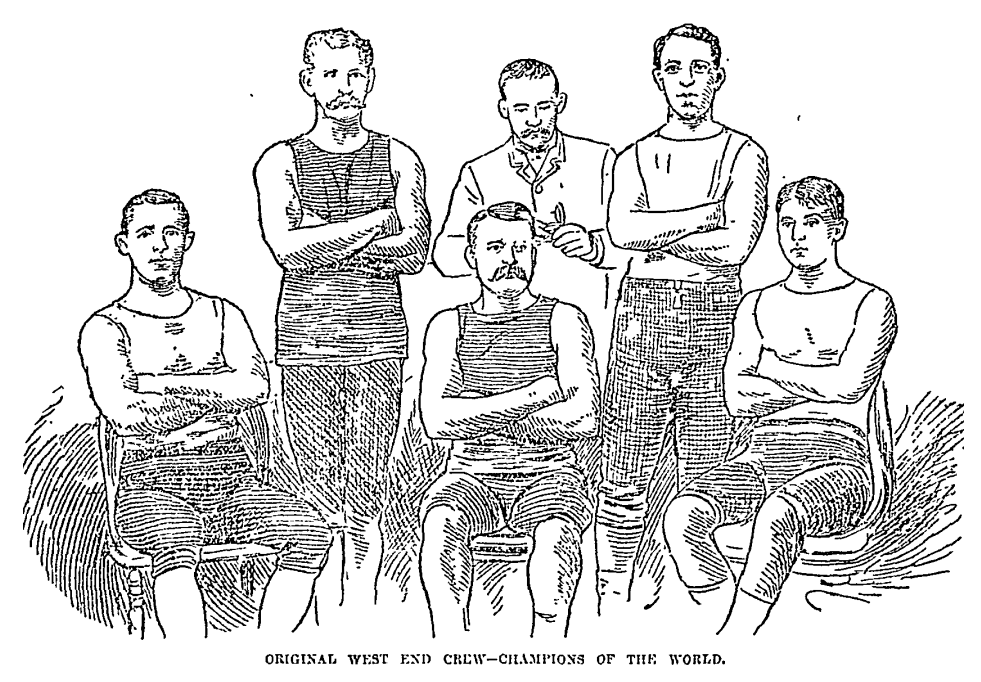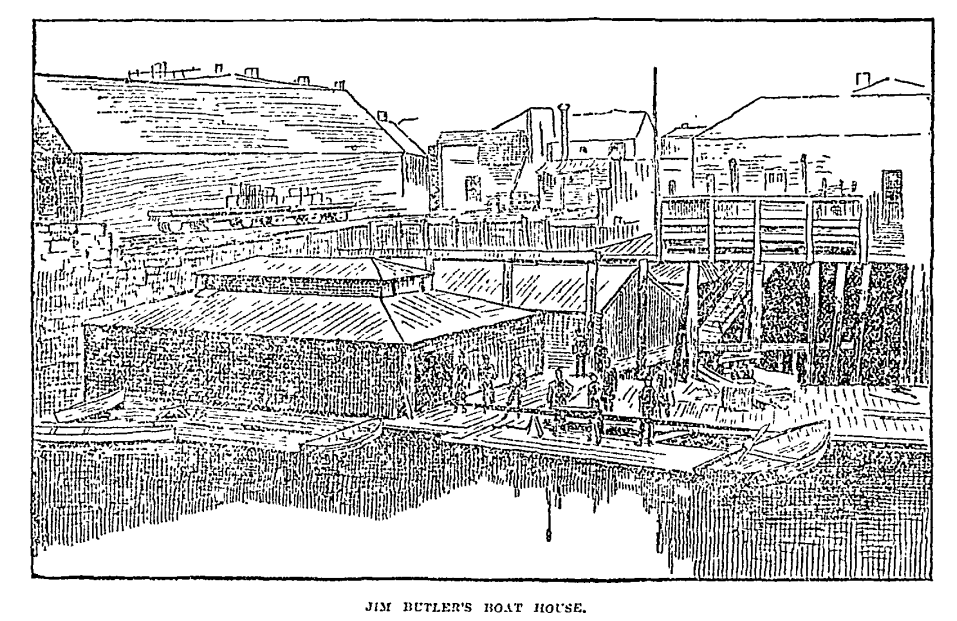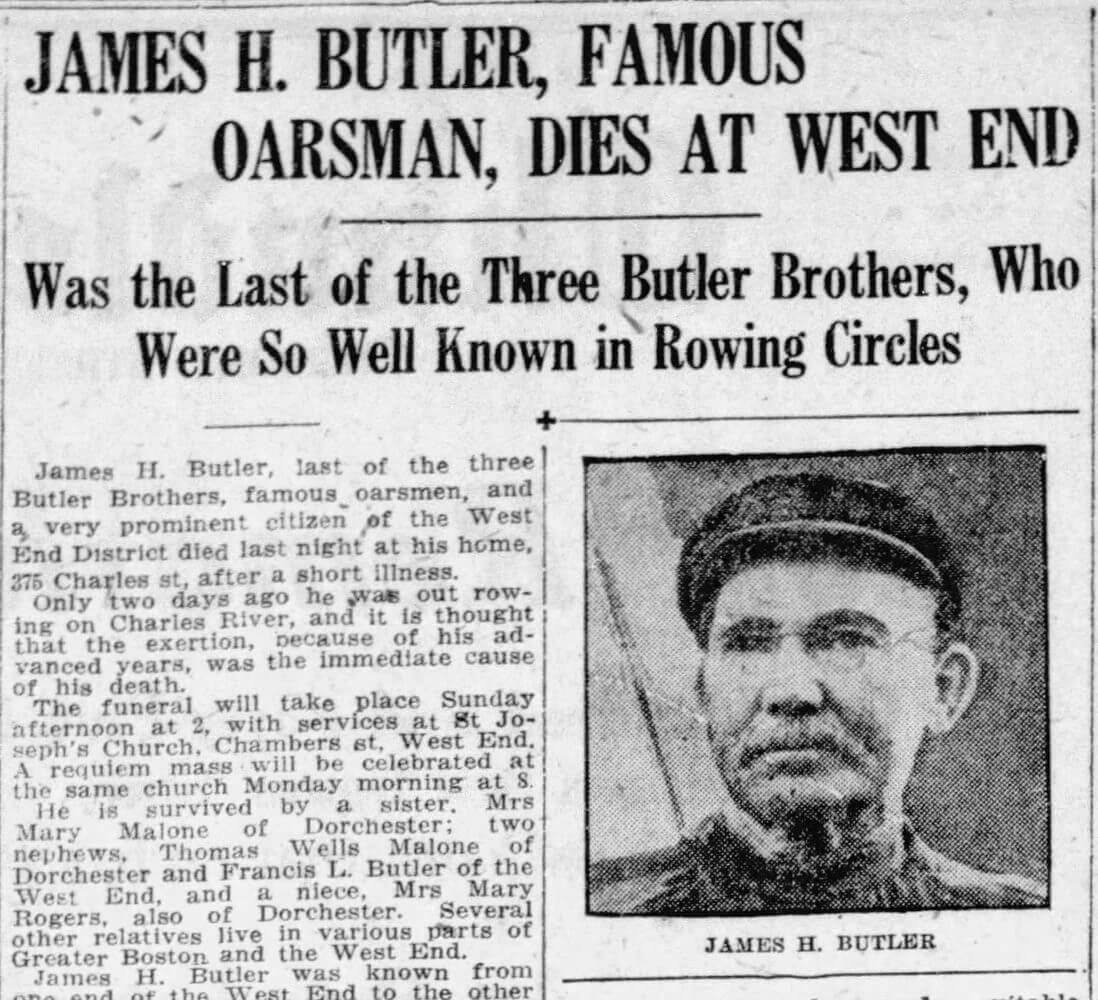James Butler
James Butler (1845-1921) was a famous rower who lived most of his life in the West End after his family came to the US from Ireland. He was instrumental in founding the West End Boat Club on the Charles River in 1865, and won many races with his brother, Thomas Butler.
James Butler was born in Ireland in 1845, and emigrated to the West End with his family when he was a child. By 1865, James and his brother, Thomas, were working together in a wool house on Federal Street. When they weren’t at their jobs, the Butler brothers cultivated their passion for rowing, the most popular sport in the United States at the time. Eugene Buckley wrote for the Boston Globe in 1889, about the Butlers’ era, that “boating occupied a position in the world of sports similar to that occupied by baseball at the present time, and in no section of the city was more interest manifested than at the West End.” The Butlers put $25 on the line when they and two other West Enders raced the boys of the “Fort Hill crew” on the Charles River in 1865. The rowing instruments of each team were distinct, the Butlers using ash oars with flat blades, and the Fort Hill crew using spoon oars with curved blades. The race was close, yet the Fort Hill rowers won in the end. The Butler brothers entered official races too, such as one regatta on July 11, 1868, the first time they entered as a double. Because James and Thomas only owned “single sculls” (boats made for one rower [single] using 2 oars [scull]), they could not practice in a double scull boat until the week before the race when they received their boat issued by the regatta. The Butlers “vanquished all comers” and won first place, receiving a prize of $150.
James Butler joined his brother Thomas and six others to found the West End Boat Club on November 5, 1865. The West End Boat Club built its own clubhouse on the Charles River and regularly held annual regattas there, as well as annual picnics involving swimming and boat races at Fresh Pond in Cambridge, and annual balls with music and many guests at Odd Fellows Hall in the South End. The third Butler brother, “Sonny” Butler, also rowed and competed in the single scull race at the West End Boat Club’s third annual picnic at Fresh Pond. James Butler at this time owned a boat livery business (renting recreational boats) and a private boathouse at the northern end of the Charles River Dam Bridge (then called Craigie’s Bridge). The business, near the site of the Boat Club, was also the site of “one of the best conducted saloons in the city.” When Butler went out to row by himself, he preferred the tidewater on the northern side of the drawbridge to the still freshwater behind the Charles River Dam. From his boathouse, Butler served the West End’s poor families by giving them, at no charge, the driftwood that he collected from the river and cut into stove-length pieces. With the previous success Butler had in business, he had the resources to purchase coal and flour that he gave to the poor in addition to the wood.
James Butler continued winning races through the 1860s and 1870s, earning the title of New England sculling champion over multiple years. In 1867, Butler married Elizabeth Breen, a West Ender whose brothers were rowers; the Breen family had been “well known in the West End section for years.” James Butler was instrumental in forming the West End crew that rowed a four-oared boat, which he had built for the West End Boat Club in 1879. On June 17, 1879, Jim Butler won a four-mile race with Aleck Brailey, Frank Hilley, and George Hosmer. This crew became “the famous West End professional four, rated as one of the best in the country” according to the Globe. Butler eventually gave up his seat on the crew to Dan Breon, a young West Ender who impressed Butler with his rowing skills. Another future member of the professional four was Jack Breen, Butler’s nephew. After the West End crew was defeated by the “Enterprise crew” some years later, Butler lost a great sum of money on the race and soon “washed his hands of racing and backing,” though he continued mentoring young boaters.
Thomas Butler died in December 1900. His funeral, on December 9 that year at St. Joseph’s Church on Chambers St., “was one of the largest funerals that had been seen in the West End for many years” given the Butler brothers’ fame as successful rowers. Elizabeth Butler died in May 1917; her funeral, on May 11 that year, was also held at St. Joseph’s and attended by many notables including Representative Martin Lomasney, the West End political boss who was a family friend. James Butler was the “last of the three Butler Brothers, famous oarsmen” when he died at his home on 375 Charles St. on January 6, 1921.
Article by Adam Tomasi
Source: Boston Globe (“West End Boat Club,” February 5, 1891, page 7; Eugene Buckley, “Ye Olden Time,” April 28, 1889, page 20; “Regatta Today,” July 5, 1897, page 2; “James H. Butler, Famous Oarsman, Dies At West End,” January 7, 1921, page 6; “Thomas C. Butler At Rest,” December 10, 1900, page 7; “Funeral at West End of Mrs. Elizabeth J. Butler,” May 11, 1917, page 9)










